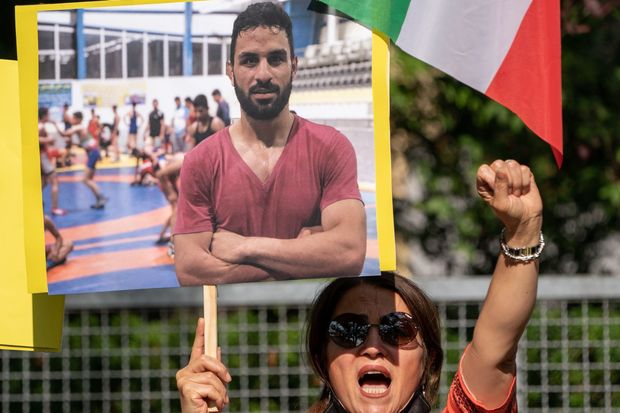Kourosh Ziabari – Asia Times: It has been a tumultuous and restive week in Iran. The country has been gripped by consternation, and social media were inundated with angry reactions to yet another execution ordered by the judiciary. This time, the convict was Navid Afkari, a 27-year-old wrestler in the southwestern city of Shiraz who was charged with murdering a security guard during the 2018 protests in Iran against economic hardships and inflation.
Pleas by global public figures such as celebrated artists, athletes and academicians, as well as international organizations, human-rights advocacy groups, sporting bodies and governments, to secure clemency for Afkari recast his case as a high-profile affair, grabbing the headlines of international media, and becoming a serious talking point among Iranians at home and abroad.
Death sentences are not a novelty in Iran; however, this time, the fact that the defendant was a wrestling champion who had incidentally taken part in anti-government protests had garnered a lot of sympathy for him, and many of those who advocated his freedom ignored his alleged role in a murder case, even going the extra mile to call him a political prisoner, while he actually had no background in political activism.
American wrestler and Olympic medal winner Brandon Slay, German Greco-Roman wrestler and world champion Frank Stäbler, US women’s wrestling champion Sally Roberts, Indian wrestling star Bajrang Punia, retired Australian soccer player Craig Foster and Canadian weightlifting Olympic champion Christine Girard were only some of the renowned athletes and luminaries who campaigned to spare the young Iranian wrestler’s life.
Even US President Donald Trump, who has displayed unmatched bellicosity toward the Iranian leadership during his tenure, courteously pleaded with authorities in Tehran to save Navid Afkari’s life and not execute him.
Sadly though, the hanging of Afkari is a fait accompli, as on September 12 judiciary officials informed his family that he had been executed in Adel Abad prison in his home city of Shiraz.
It is a daunting task to comment on the circumstances surrounding the young Iranian wrestler’s detention, his indictment and the course of events leading to his execution, considering the highly sensationalized, emotive climate generated by his trial and final fate.
On social media, he was eulogized as a hero, hashtags went viral that “his path will be remembered,” Reza Pahlavi, the son of Iran’s deposed Shah Mohammad Reza Pahlavi, called his execution a “murder,” and some Iranian media based overseas went so far as naming him a “martyr of freedom.”
Indisputably, these descriptions sound rather exaggerated. To put it bluntly, to qualify as a “freedom hero” and “martyr,” some sort of accomplishment and social impact is required, but the young wrestler was simply one of thousands of Iranians who had taken to the streets to protest their worsening living conditions and government mismanagement.
Therefore, sentimentalizing his story, however heart-wrenching, will only eclipse a sober and objective overview of what he did and lived through.
Yet there are important questions about the legal proceedings and Afkari’s ultimate execution that need to be answered, and the different branches of Iranian government should live up to their obligations in calming the communal rage of a nation that is now only demanding accountability.
A fair trial?
Navid Afkari claimed in audio files he clandestinely recorded in prison, circulated on Persian-language media days before his execution, that he was tortured while in custody and forced into making false confessions and admitting responsibility for the killing of Hassan Turkman, a security guard for a water-supply company in Shiraz, during the 2018 protests.
The judge presiding over his case refused to consider his claims of having been tortured on several occasions at the hands of prison guards and soldiers.
Amnesty International has reported that he was denied access to a lawyer and other fair-trial guarantees. The advocacy organization also said the court brushed off his appeals to the judge to bring another detainee who had witnessed his torture to testify to the physical and mental harassment he had been subjected to.
His execution also took place under questionable circumstances. CNN reported that a group of philanthropists in Shiraz had been raising money to appease the family of the victim Afkari is believed to have killed and pay them restitution, in return for which they would pardon him, thus annulling the death penalty.

